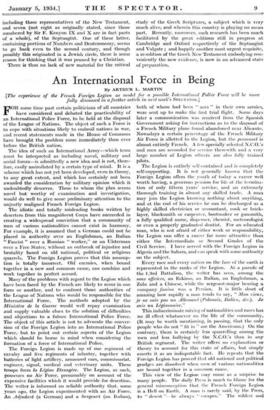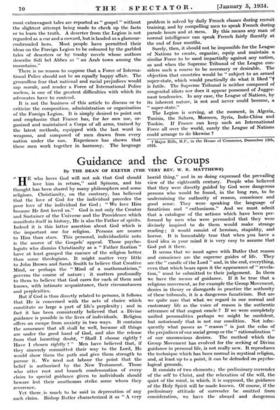An International Force in Being
By ARTHUR L. MARTIN
.[The experience of the French Foreign Legion as model for a possible International Police Force will be more fully discussed in a further article in next week's SPECTATOR.] FOR some time past certain politicians Of all countries have 'considered and debated the practicability of an International Police Force, to be held at the disposal of the League of Nations. The object of such a Force is to cope with situations likely to embroil nations in war, and recent statements made in the House of Commons have brought the problem more immediately than ever before the British nation.
The idea of such an International Army—which term must be interpreted as including naval, military and aerial forces—is admittedly a new idea and is not, there- fore, easily assimilated by a certain type of mind. It is a scheme which has not yet been developed, even in theory, to any great extent, and which has certainly not been awarded the consideration by military opinion which it undoubtedly deserves. Those to whom the plan seems novel but• worthy of examination and investigation, would do well to give some preliminary attention to the unjustly maligned French Foreign Legion.
The idiotic and totally misleading books written by deserters from this magnificent Corps have succeeded in creating a widespread conviction that a community of men of various nationalities cannot exist in harmony. For example, it is assumed that a German could not be placed in authority over an Englishman, an Italian " Fascist " over a Russian "worker," or an Ulsterman over a Free Stater, without an outbreak of injustice and brutality based on old national, political or religious quarrels. The Foreign Legion proves that this assump- tion is totally incorrect. Old enemies, when bound together in a new and common cause, can combine and work together in perfect accord.
Many of the problems with regard to the Legion which have been faced by the French are likely to recur in one form or another, and to confront those authorities of the League of Nations who would be responsible for the International Force. The methods adopted by the illinistere de la Guerre would well repay examination and supply valuable clues to the solution of difficulties and objections to a future International Police Force. The object of this article is not to advocate the conver- sion of the Foreign Legion into an International Police Force,- but to point out certain aspects of the Legion which should be borne in mind when considering the formation of a force of International Police.
The Foreign Legion is made up of one regiment of cavalry and five regiments of infantry, together with batteries of light artillery, armoured cars, commissariat, engineer, signal, medical and veterinary units. These troops form la Legion Etrangere. The Legion, as such, possesses no Air Force, presumably on account of the expensive facilities which it would provide for desertion. The writer is informed on reliable authority that, some years ago, the Legion experimented with an Air Force. An Adjudant (a German) and a Sergeant (an Italian), both of whom had been " aces " in their own armies, were sent up to make the first trial flight. Some days later a communication was received from the Spanish Government asking for instructions as to the disposal of a French Military plane found abandoned near Alicante. Nowadays a certain percentage of the French Military Air Force is allotted to the Legion, but the personnel is almost entirely French. A few specially selected N.C.O.'s and men are seconded for service therewith and a very large number of Legion officers arc also fully trained pilots.
The Legion is entirely self-contained and is completely self-supporting. It is not generally known that the Foreign Legion offers the youth of today a career well- worth having, a generous pension for life at the termina- tion of only fifteen years' service, and an extremely thorough training in almost any skilled trade. A man may join the Legion knowing nothing about anything, and at the end of his service he can be discharged as a highly skilled electrician or accountant, cook or brick- layer, blacksmith or carpenter, bootmaker or gunsmith, a fully qualified nurse, dispenser, 'chemist, meteorologist or even a properly graduated dentist. For an educated man, who is not afraid of either work or responsibility, the Legion can offer a career far more attractive than either the Intermediate or Second Grades of the Civil Service. I have served with the Foreign Legion in Algeria and the Sahara, and can speak with some authority on the subject.
Every race and every nation on the face of the earth is represented in the ranks of the Legion. At a parade of the 1/3rd Battalion, the writer has seen, among the sous ofliciers, an Eskimo, an Italian, an Englishman, a Zulu and a Chinese, while the sergeant-major bearing a company fanion was a Persian. It is little short of amazing how rapidly a man tends to say, "Mon vieux, je ne suis pas un Allentand (Polonais, Italien, Je suis tin Legionnaire."
This indiscriminate mixing of nationalities and races has no ill effect whatsoever on the life of the community. (It may be worth mentioning, in passing, that the only people who do not "fit in " are the Americans.) On the contrary, there is certainly less quarrelling among the men and less bullying by the N.C.O.'s than in any British regiment. The writer offers no explanation or theory to account for this state of affairs, but simply asserts it as an indisputable fact. He repeats that the Foreign Legion has proved that old national and political grudges are dissolved when men of various nationalities are bound together in a common cause.
This view of the Legion may come as a surprise to many people. The daily Press is much to blame for the general misconception that the French Foreign Legion is a Hell on Earth. A man is rarely said, by the Press, to "desert "—he always "escapes." The wildest and most extravagant tales are reported as " gospel" without the slightest attempt being made to check up the facts or to learn the truth. A deserter from the Legion is not regarded as a cur and a coward, but is lauded as a glamour- enshrouded hero. Most people have permitted their ideas on the Fbreign Legion to be coloured by the garbled tales of deserters or by trashy novels whose authors describe Sidi bel Abbes as "an Arab town among the mountains." • There is no reason to suppose that a Force of Interna- tional Police should not be an equally happy affair. The groundless fear that national and racial prejudices would sap morale, and render a Force of International Police useless, is one of the greatest difficulties with which its advocates have to contend.
It is not the business of this article to discuss or to criticize the composition, administration or organization of the Foreign Legion. It is simply desired to point out and emphasize that France has, for her own use, or- ganized and maintained a Corps of all arms, trained by the latest methods, equipped with the last word in weapons, and composed of men drawn from every nation under the sun. Experience has shown that these men work together in harmony. The language problem is solved by daily French classes during recruit training, and by compelling men to speak French during parade hours and at mess. By this means any man of. normal intelligence can speak French fairly fluently at the end of four months.
Surely, then, it should not be impossible for the League of Nations to create, organize, equip and maintain a similar Force.to be used impartially against any nation, as and when the Supreme Tribunal of the. League con- siders such a course to be necessary or desirable. The objection that countries would be "subject to an armed super-state, which would practically do what it liked "t is futile. The Supreme Tribunal is neither composed of congenital idiots nor does it appear possessed of Jugger- naut tendencies. In any case, the League of Nations, by its inherent nature, is not and never could become, a "super-state." The Legion is serving, at the moment, in Algeria,. Tunisia, the Sahara, Morocco, Syria, Indo-China and. Tonkin. If France can keep such an International Force all over the world, surely the League of Nations could arrange to do likewise ?
t Major Hills, M.P., in the House of Commons, December 13th, 1933.







































 Previous page
Previous page